Paul Levinson's Blog: Levinson at Large, page 153
August 18, 2019
The Rook Season 1 Finale: Letter to Her Earlier Self
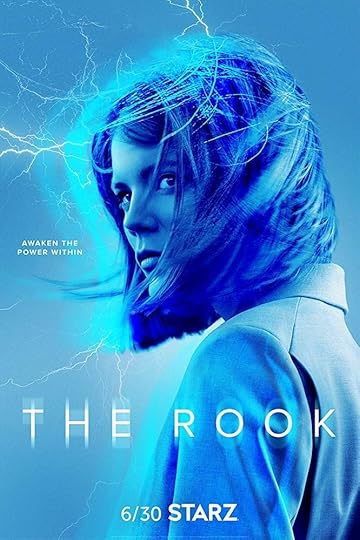
The Rook Season 1 finale, just on tonight, was an excellent, brilliant episode on all kinds of levels, including Gestalt in unified attack action again, and Myfanwy getting the better of the Russian guy who looked like Putin.
But my favorite part was next to the very end, when Myfanwy writes a letter to her earlier self. Of course that's impossible, because she can't time travel, and that's why she sends the letter to her earlier self by throwing it over the bridge into the river Thames, the place where all of this started. But there's enormous narrative significance in this. The preceding episodes this season all play off the letter and communications Mifanwy's younger self sent to her older self, the self whose mind had been wiped. The reversal of this in the end shows that Myfanwy has recovered her mind, or enough of it to be a full person, and write meaningful letters to herself again.
Two other departure points near and at the very ending. Monica asks to have her memory wiped, so she can forget about the guy who's been haunting her. The result is she might be dead. Meaning? Maybe that guy meant so much to her that she can't be alive with no memory of him. But I'm betting if there's a second season - which I sure hope there is - we'll see Monica recovered, at least in some form.
And Linda joining Myfanwy's sister's group of free EVAs is a very nice touch, too. This means that, if there is a next season, we may see Linda and Myfanwy at active odds, since Myfanwy is apparently still part of the Checquy,
Lots of things to look forward to in a season two, which as of this instant hasn't bee announced. I'm going to use all of my EVA powers as a reviewer to make that happen. These powers are fairly subtle, but you never know.
See also: The Rook 1.1: Dickian Pastiche ... The Rook 1.2: Live Details ... The Rook 1.3: Gestalts ... The Rook 1.4: The Bristol Stomp ... The Rook 1.5: The Home Secretary ... The Rook 1.6: Family ... The Rook 1.7: A Kind of Time Travel

They're coming out into the open, for the first time in centuries .... Paul Levinson's books ... Paul Levinson's music
Published on August 18, 2019 20:44
Review of John Stith's Pushback: Grab It
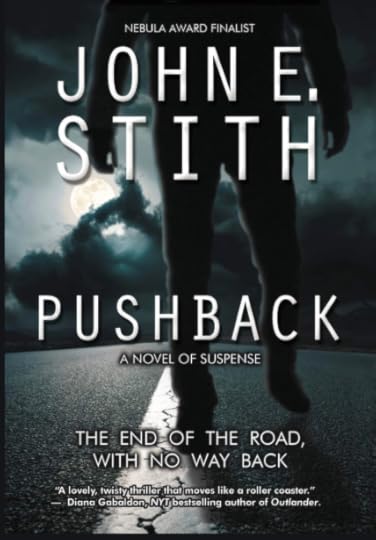
I usually review science fiction novels here. But when I came across Pushback, an adrenalin pumping mystery novel by John Stith, who wrote Red Shift Rendezvous, one of my all-time favorite science fiction novels, hey, how could I resist? Besides, the who dunnit of mystery and detective fiction is a close cousin of the what dunnit of science fiction.
The basic story of Pushback is an amiable investment counselor in Colorado Springs, Dave Barlow, finds himself the victim of an increasing series of pranks - increasing in both frequency and intensity - which soon became bizarre and sadistic attempts to murder him. It starts when he shows up to a high school reunion and nobody remembers him because the people at the reunion are unknown to Dave and vice versa. This escalates into his car filled with concrete, Dave almost killed in a hit-and run, his home leveled, Dave poisoned having dinner in a nice restaurant with a pretty actress trying to help him, and Dave nearly being blasted by a shotgun rigged to go off when he shows up at a client's home to talk finances. Who is behind this and why?
Dave may be amiable but he's no slouch. He fights back with intelligence and style, reported through the wry voice of John Stith, who serves up this surprising tale with his customary eye for detail, keen sense of humor, and immersion in decades of popular culture. Dave is equally at home citing Z Z Top and learning how to explode eggs in a microwave on YouTube. Middle-aged guys coming at Dave with golf clubs are "foursomes of the dead," and he notices a woman in tight jeans "closer to the paint family than the clothing family".
On that last point, there's plenty of romance in Pusback via Dave's new love, Cathy, and a winning tenderness throughout, making it no surprise that the novel was nominated for the Daphne du Maurier Award. The location in Colorado Springs makes for a great pastel background for this narrative, which, come to think of it, would look great on any kind of screen.
See also Book Review: Redshift Rendezvous by John Stith is Perfect Science Fiction Mystery Hybrid Paul Levinson's books ... Paul Levinson's music
Published on August 18, 2019 11:14
August 12, 2019
The Rook 1.7: A Kind of Time Travel

A great, almost-all explained penultimate of the season episode 1.7 of The Rook last night, in which we learn how Myfanwy knew she was going to lose her memory, and in turn why she wrote that note and left other information for her future amnesiac self, and how specifically she got into that position with no memory on the bridge, surrounded by a bunch of dead guys.
The episode is one long flashback that begins with yet another EVA with another kind of power. It's someone for whom the month ahead or longer can seem but a split-second present, in which the EVA can see all these future events. Myfanwy has discovered her, and she tells Myfanway that Myfanwy will have her memory wiped, by someone under the sea.
We already knew that Farrier was responsible for Myfanwy's memory loss, and Myfanwy discovers that, too, when she sees Farrier standing under a picture of the sea. Farrier's reasons are not completely bad, maybe not bad at all. Erasure of her memories of Checquy is the way that Farrier can let Myfanwy leave the organization and have a normal life, which is what her sister who talks to Farrier wants.
The guys on the bridge were killed by Myfanwy, whose uncontrolled EVA power manifested when two groups approached her, and she had just lost her memory. Afraid, confused, she reflexively protected herself from the groups which she saw as would-be attackers.
Meanwhile, earlier, we get a steamy scene of Myfanwy with the Gestalt, which explains the relationship see has had with them in the previous six episodes.
All in all, a very nice piece of work, with leaves open only one really big question: what will Myfanwy do in the present, i.e., the way we saw her at the end of episode 1.6 last week? See you here next week, after the season one finale.
See also: The Rook 1.1: Dickian Pastiche ... The Rook 1.2: Live Details ... The Rook 1.3: Gestalts ... The Rook 1.4: The Bristol Stomp ... The Rook 1.5: The Home Secretary ... The Rook 1.7: Family

They're coming out into the open, for the first time in centuries .... Paul Levinson's books ... Paul Levinson's music
Published on August 12, 2019 19:26
August 11, 2019
City on a Hill 1.9: Changes

With only one episode to go this season, on next week, City on a Hill pulled out all the stops tonight in 1.9. In a nutshell -
Frankie and Jimmy go ahead with the Brinks job in Fall River, but it doesn't succeed, since Jimmy has told law enforcement exactly what's going to happen. But, although the heist is stopped, there's all kinds of significant damage, expected and unexpected, including -
Hank gets killed (which makes the second major character with a badge to be killed on this show, the first being J. R. Minogue).Frankie sees the way Jimmy and Jackie are looking at each other, and realizes Jimmy is the rat.DeCourcy wanted to stop this robbery without Jackie's help. But Jackie of course shows up, plays a major role in getting the bad guys - he rams their car - and DeCourcy is furious. I gotta say, though, that it's not right to say Jackie stole the glory. He, after all, earned some of it, by ramming the getaway car, right?Those three developments change everything - well, certainly the second and third, since Hank was not that big a character. But next week's season one finale won't be enough time to work all this out. Good thing there's a second season.
In either that second season, or in next week's finale, Frankie may well kill Jimmy. And I predict that DeCourcy will actually reconcile with Jackie - unless Rachel comes up with some damning evidence, like proof that Jackie killed Clay. Hey, that's why it'll good to see next week's season finale, rather than relying on my predictions.
See also City on a Hill: Possibilities ... City on a Hill 1.2: Politics in a Cracked Mirror ... City on a Hill 1.3: One Upping The Sopranos ... City on a Hill 1.4: Enjoyable Derivative ... City on a Hill 1.6: Tony's Mother, Mayhem, and Family ... City on a Hill 1.7: The Bodies ... City on a Hill 1.8: Personal Business and Its Accompaniment
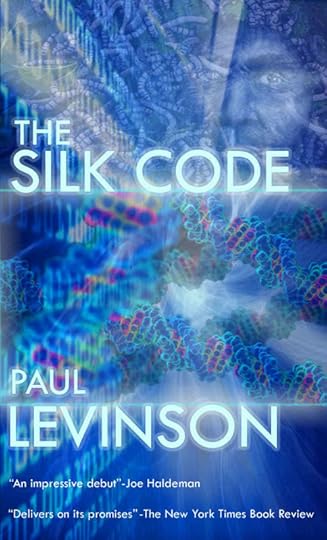
Paul Levinson's books ... Paul Levinson's music
Published on August 11, 2019 22:17
The Loudest Voice Finale: Truth

The Loudest Voice concluded tonight with John Lennon's "Gimme Some Truth," played under postscripts that tell us what happened to major characters after the story portrayed in the series ends. In many ways, that combo - Lennon's song and the postscripts - were the most compelling part of the series, which was plenty compelling, already.
For example, why does Beth Ailes maintain her husband's innocence after we see her in the series finally disbelieving him, after being told that Gretchen Carlson has tapes of what Roger said to her? Since there's no public record of what Beth said to Roger privately, let alone her private facial expressions, the most likely conclusion is: Beth's coming to believe the charges against Roger may be artistic license on the part of the The Loudest Voice. As I often say, docu-dramas are not documentaries, and even documentaries, though they don't fabricate scenes, may not tell the whole story.
Along the same lines, why did Ailes's assistant, Judy Laterza, first support Roger in the testimony she gave which she knew Roger was seeing on one of his cameras, and then, after Roger's death, continue to be silent on everything? How much of the scene in which Roger invited her to join Beth and him for dinner, and Judy was delighted, until Beth nixed it, actually happened?
I raise these points not because I disbelieve Gretchen Carlson and the other women who brought charges against Roger, but because I think we need to keep reminding ourselves that the rendition of this that we saw in The Loudest Voice may be, at the very least, a narrative of truth embellished, in one way or another. And this, in turn, is important to keep in mind when we consider Trump and the political part of the story, and Roger's view, depicted in The Loudest Voice, that he was more responsible than anyone or anything else for Trump's 2016 victory. That may or may not be true, even though it's certainly a powerful story.
And there actually are at least two related questions here: One, did Ailes believe that he was responsible for Trump's becoming President? And, two, was Ailes indeed responsible for Trump's becoming President? As I've said before in these reviews, I certainly don't think the answer to the second question is yes. And I'm just not sure about the first.
But such questions only add to the power of The Loudest Voice, and, indeed, everything about The Loudest Voice was powerful, especially Russell Crowe's performance as Aisles, which abundantly deserves an Emmy. Kudos to everyone who put together this little series for creating an excruciatingly timely and unnerving masterpiece.
See also: The Loudest Voice 1.1: Fox Launch ... The Loudest Voice 1.2: September 11 and After ... The Loudest Voice 1.3: Prelude to Trump ... The Loudest Voice 1.4: "We Create the News" ... The Loudest Voice 1.5: Was Ailes Really All That Powerful? ... The Loudest Voice 1.7: "Television Has Replaced the Political Party"
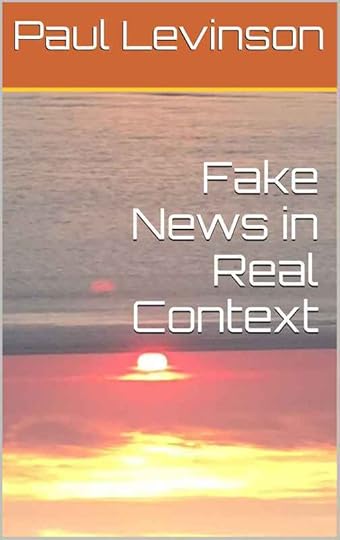 Paul Levinson's books ... Paul Levinson's music
Paul Levinson's books ... Paul Levinson's music
Published on August 11, 2019 20:31
August 9, 2019
Fleabag: Beyond the Fourth Wall
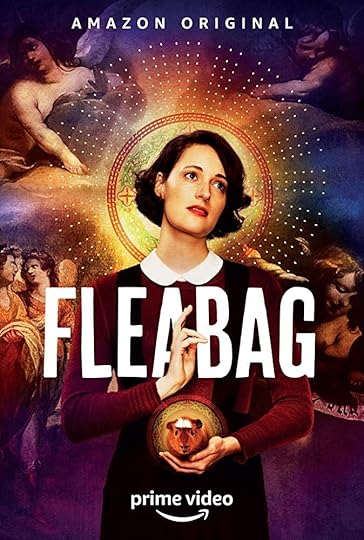
My wife and I just binged Fleabag on Amazon Prime Video. Easy to do, since the two seasons add up to a total of 12 episodes (or about half of what a single season of network television used to be). Easy to watch, since the dialogue was brilliant, frank, witty, and hilarious - not to mention that it all takes place in London (our second favorite city, after New York, where we live).
But the most provocative part of the series - the whole serious is delightfully and sometimes seriously provocative - comes in the second season, where the conceit of the hero (Fleabag) talking to the camera, or in theatrical parlance, breaking the fourth wall (the first three being the back and the two sides of the stage), takes a momentous turn: a crucial character, the Priest (who loves Fleabag, and with whom Fleabag falls in love), is aware of Fleabag talking to the audience.
In our current age of streaming television, the fourth wall was broken early on, in House of Cards, in which first Frank and eventually Claire talk to us, the audience. (It was broken dozens of times in earlier television, movies, and plays - the Wikipedia article provides a good summary. My favorite was Magnum PI.) But even before including the Priest in the fourth wall breaching, Fleabag did far more than talking to us across the screen. Her eyes, lips, the way she held her head, provided a compelling and enchanting part of the dialogue, which soon became essential to almost every scene, and in total provided a veritable encyclopedia of non-verbal expressions and how they shed meaning on verbal communication as silent counterpoint.
Phoebe Waller-Bridge, who created, wrote, and plays the lead role (Fleabag) in the series, won a British Comedy Award for her performance in the first season (2016). The second season (2019) has thus far been nominated for a boatload of awards (eleven). If there was an award for breaking the fourth wall, I'd give it to Walter-Bridge for the first season, and then give her a special additional award for extending the wall-breaking in the second.
There's no word yet on a third season, and the current indication is that the second season is the final. But with the fourth wall ripped so wide open, there's another boatload, of questions, to explore. Why does the Priest see Fleabag's mind looking away, being absent, when she looks and talks to us in the audience? He is not partaking in the breaching himself - he's not communicating with the audience - and he doesn't quite know that Fleabag is, either. But how does he come to see she's absent for that split second from him? Because he loves her so much?
What will happen when Fleabag admits to him what's happening - so far, she's not allowing herself to tell him - will he believe her? I don't for a minute think his telling her he prefers God to loving her is the end of their romantic and erotic relationship. But even if it is, there's no reason that he won't continue seeing in her eyes that she's looking at someone else - i.e, a lot of someones, us.
It took three years after the first to get a second series. I'm eager to see the third, however long that takes.
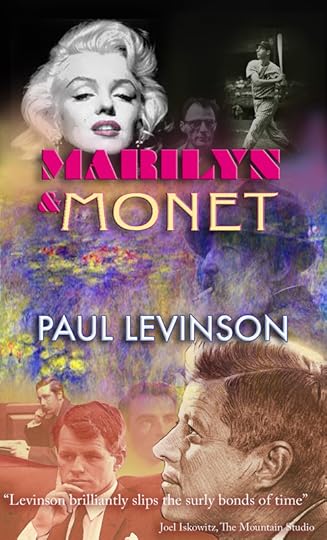
Paul Levinson's books ... Paul Levinson's music
Published on August 09, 2019 23:06
August 7, 2019
City on a Hill 1.8: Personal Business and Its Accompaniment

The last scene of City on a Hill 1.8 settled our impression of Jackie, if we had any doubt before. His swagger, his braggadocio, is much more than that. When he tells his wife he'll kill the guy who assaulted Benny and landed her in the hospital, he was more than blowing off steam. City on a Hill specializes in a punch-in-a-gut last few minutes. Jackie does more than punch this guy, Clay. He pulls his gun and shatters him.
In other words, Jackie is exactly who he says he is. He's beyond and above the law. He not only cuts whatever corners he needs to get the bad guys, he's not above using his gun to settle a personal score. For better or worse, he's genuinely someone to be reckoned with. Someone, to return to an earlier episode, who may well have pushed that reporter down the stairs.
The song that accompanies this scene makes it all the more memorable. It's Jackie DeShannon's "Put A Little Love in Your Heart". We hear it earlier as accompaniment when Jimmy gets the stuffing beat out of him. That was effective enough. But its reprise when Jackie takes care of personal business is creme de la creme. Jackie accompanying Jackie.
Not only that. I have to say, Jackie De Shannon sounds a lot like Jenny Rohr. Jill Hennessy, who plays Jenny flawlessly, is also a singer. It occurred to me that she could've been singing the song. You never know.
City on a Hill has been renewed for a second season. I hope they have more Jackie DeShannon songs. I'd recommend "When You Walk In the Room" or "Bette Davis Eyes".
See also City on a Hill: Possibilities ... City on a Hill 1.2: Politics in a Cracked Mirror ... City on a Hill 1.3: One Upping The Sopranos ... City on a Hill 1.4: Enjoyable Derivative ... City on a Hill 1.6: Tony's Mother, Mayhem, and Family ... City on a Hill 1.7: The Bodies

Paul Levinson's books ... Paul Levinson's music
Published on August 07, 2019 17:06
August 5, 2019
Captain Phil interviews Paul Levinson about his New Music, Science Fiction, and Trump
Welcome to Light On Light Through, Episode 117, in which the notorious Captain Phil (on WUSB Radio) interviews me about my new music, latest science fiction, and Donald Trump's current assaults on democracy. Phil also plays, at the start of the episode, two rough mixes from my forthcoming Welcome Up album of science fiction songs, to be released by Old Bear Records this Fall: "Alpha Centauri" and "Samantha". We discuss such topics as the return of Jeff Lynne and the re-launch of Amazing Stories, in which several of my new science fiction stories have appeared. I always have a good time talking to Phil, and this interview was one of the best.
Helpful links:Robinson Calculatormore on anniversary issue of Amazing Storiesmy review of Jeff Lynne at Prudential in Newarkmy review of The Loudest VoiceLevinson on television about Trump
Check out this episode! Paul Levinson's books ... Paul Levinson's music
Published on August 05, 2019 16:07
CP interviews PL about his New Music, Science Fiction, and Trump
Welcome to Light On Light Through, Episode 117, in which the notorious Captain Phil (on WUSB Radio) interviews me about my new music, latest science fiction, and Donald Trump's current assaults on democracy. Phil also plays, at the start of the episode, two rough mixes from my forthcoming Welcome Up album of science fiction songs, to be released by Old Bear Records this Fall: "Alpha Centauri" and "Samantha". We discuss such topics as the return of Jeff Lynne and the re-launch of Amazing Stories, in which several of my new science fiction stories have appeared. I always have a good time talking to Phil, and this interview was one of the best.
Helpful links:
Robinson Calculator more on anniversary issue of Amazing Stories my review of Jeff Lynne at Prudential in Newark my review of The Loudest Voice Levinson on television about TrumpPaul Levinson's books ... Paul Levinson's music
Published on August 05, 2019 16:07
August 4, 2019
The Loudest Voice 1.6: "Television Has Replaced the Political Party"

That's what Roger Ailes says in The Loudest Voice 1.6 - "television has replaced the political party."
I'm not so sure. I mean, I believe Roger Ailes certainly thought that and likely said that. But I'd say Twitter more than television is the most significant political medium in this Trumpian age. Maybe 2016 was a little too soon for anyone, even Ailes, to recognize that. Maybe Ailes was constitutionally incapable of recognizing the Twitter revolution, given his running the engines of television for politics, going back to Nixon.
As I've been saying all along, I don't quite buy a lot of what we're seeing in The Loudest Voice about Ailes and politics. Most especially that he made Donald Trump. What he made was Fox News as such a behemoth of cable news. That part, I believe. As for the womanizing, I wasn't there so I don't know any of that for a fact. But I have no problem believing that, either.
But not the Trump part. The limited series will end next week, and will leave us with the message that Trump was an Ailes creation. The 2020 election is still more than a year away. If Trump loses, that will support the thesis of this series. Trump lost because he lost his diabolically powerful media booster. If Trump wins, that would mean that Ailes was not so crucial to Trump after all.
You know what? I usually like to be proven right in my media criticism. But there are some things more important than proof of professional acumen. As a human being, I deeply hope that Trump loses, and therein lends support to the claim that Ailes got Trump in office the first time, and Trump lost the second time he ran for President because Ailes was no longer around (as in, not on this Earth).
The series ends next week. I'll say a little more about this then. As for that welcome ultimate disproof, we'll have to wait until November 2020.
See also: The Loudest Voice 1.1: Fox Launch ... The Loudest Voice 1.2: September 11 and After ... The Loudest Voice 1.3: Prelude to Trump ... The Loudest Voice 1.4: "We Create the News" ... The Loudest Voice 1.5: Was Ailes Really All That Powerful?
 Paul Levinson's books ... Paul Levinson's music
Paul Levinson's books ... Paul Levinson's music
Published on August 04, 2019 22:15
Levinson at Large
At present, I'll be automatically porting over blog posts from my main blog, Paul Levinson's Infinite Regress. These consist of literate (I hope) reviews of mostly television, with some reviews of mov
At present, I'll be automatically porting over blog posts from my main blog, Paul Levinson's Infinite Regress. These consist of literate (I hope) reviews of mostly television, with some reviews of movies, books, music, and discussions of politics and world events mixed in. You'll also find links to my Light On Light Through podcast.
...more
- Paul Levinson's profile
- 341 followers



